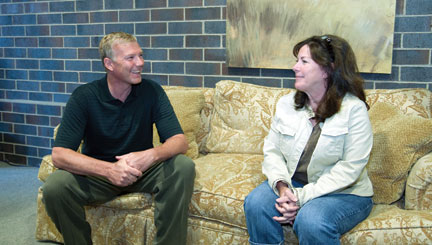
Church Executive recently published an interview with Rick Rusaw, Senior Pastor at LifeBridge Christian Church in Longmont CO and co-author with Eric Swanson of The Externally Focused Quest. Here is an excerpt from that interview which you can read in full by clicking the link at the beginning of this post:
What inspired you to encourage churches to be more externally focused?
I think what happened was we had a sense that even though our church was growing and we were doing a lot of good things inside the church, we were not really making much of a difference in the community.
We realized that we weren’t engaged at the root level of a lot of issues. So we got asked to start a school, and I said maybe we shouldn’t start a school, maybe we should just get more involved with public schools. So we started volunteering and helping out. For years we just did service projects, such as raking leaves, and we looked for ways to connect. We raked a lot of leaves first before we got invited to do bigger things.
So you started developing relationships with people in the community.
Yes, with public schools, nonprofits and government agencies, and over the years our involvement grew. Now we are involved in 54 partnerships in town. I think one of the things that happens is that a church feels they want to help the homeless and they start a homeless ministry, but those who are already doing that see the church as a competition. So what we did was find out who were working with the disenfranchised kids or single moms and we came alongside them. We create relationships, and the more relationships we have, the more we can speak into how they do what they do.
Building relationships takes years, definitely not the easiest route to reaching people for Christ.
My advice to churches is if you’re going to be externally focused only for a day, maybe you shouldn’t do anything. Don’t just show up for one day and say you want to be helpful, but then you’re not there the rest of the time. At our church we look for ongoing ways with which we could serve. We have teams of people who help the facility staff at various schools, and what we find is they open the doors for more opportunities. They say, “We have this problem, will you help us?” But it takes some time for people to trust that you’re really going to be there and keep doing what you’re doing. So again back to that line, you rake a lot of leaves and eventually you get more opportunities. Were people in the public schools and community agencies suspicious or resistant at first?
Were people in the public schools and community agencies suspicious or resistant at first?
Yes, very much so. We went to the school district and asked if there was anything we could do to help, and they said they couldn’t really see what that would be — the whole church thing — they were not sure. But now they meet with us and give us a list of things to help them, and not just to fix broken things or paint walls, but they give us opportunities to help them with programming, resourcing, tutoring and after-school programs. I think if we do service for the sake of growing our church, we’ll miss out on its real value and power. What we create are relationships. Eventually, we get asked why we do what we do, then we get to talk about God’s grace and why we care.
Sometimes people in the church are not encouraged to do things for the community unless what they want to do aligns with the “vision” of the church.
One of the things we do is encourage all of our ministry areas to do something that’s externally focused. We don’t want to have a Department of Externally Focused. We want community service to be a part of who we are and what we value. We encourage people to find a place where God can use them to make a difference. Of course we can’t do everything, and in those cases we redirect them to similar kinds of things. And a lot of times people come with great ideas about what we ought to do, but they don’t really want to get involved. I’ve actually gotten better at saying “why don’t you make that happen and let us know how we can help you.” Whatever vision gets set for a local church, unless the leaders care about becoming connected to their community and becoming a part of the solution, the church is not going to have an impact.








No comments:
Post a Comment